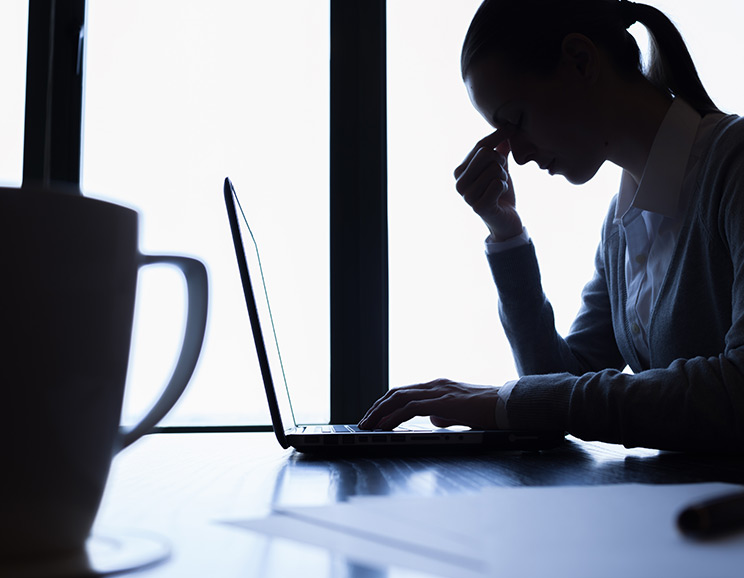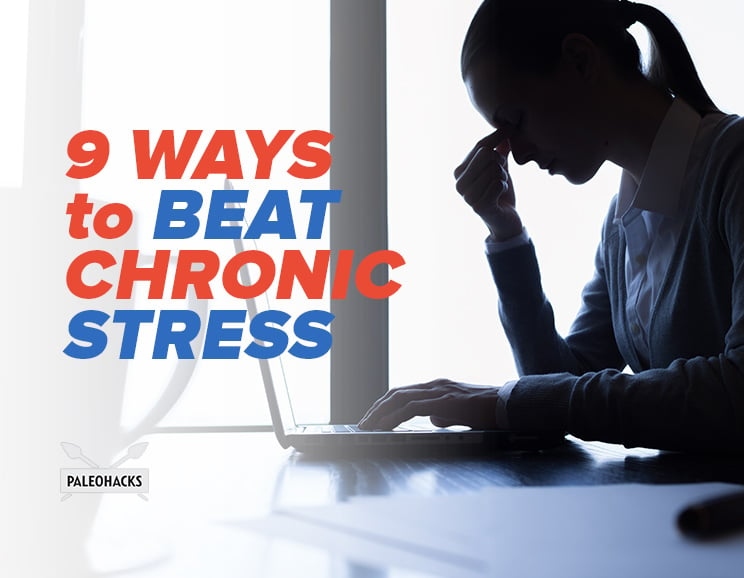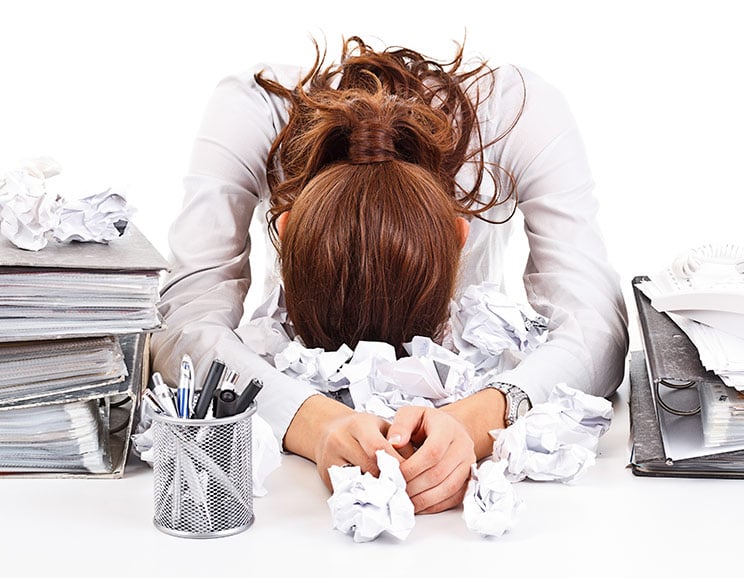As the very fabric of our society has changed, we have all become more stressed. In fact, the data all shows that we are all stressed like never before.
We have more options (some would say too many options), many responsibilities, a digital life to manage, a real life to manage, a job (or two), children, television shows – you can see what I mean.
But stress is also one of the most destructive things for our body – especially chronic stress, which is small, but constant. And guess which category all of the aforementioned stressors fall into? That’s right – chronic stress. When we are constantly stressed, our entire body misbehaves in a multitude of ways. Hormones are thrown off balance, neurological processes go haywire, and we are left frazzled, anxious and uncomfortable. And all of that leads to poor food choices.
Want to train your brain to be happier and healthier?
Click here to receive our FREE 7-Day Meditation Challenge!
But Wait – Why Is Stress Bad?
Stress is a killer – the research clearly states it. But just how pervasive stress has become is not well understood by the majority of the population. What is also not fully understood is the devastating effect this constant stream of stress has on our body, as well as our minds.
And perhaps worst of all, even if we think we are stressed; our body reacts like we are stressed. It’s truly a vicious cycle. Avoiding stress, or at least trying to limit it, is vital for a variety of reasons. For starters, your eating habits will likely improve, as stress is one of the biggest reasons for poor food choices.
Tied in with this is better sleep. Since a lack of sleep has been scientifically tied to poor dietary choices the following day, you can see just how interdependent all these elements truly are.
The Little Things Add Up

Chronic stress has even been linked to cancer and diabetes – not good. The science here mostly points to a chronic systemic state of low-level inflammation – due to excess stress leading to poor choices. The fight or flight response is just a small part of what is happening inside our body when stress hits us.
Interestingly, small things, like how we start each and every day, can have a big impact on our stress levels. For example, if you hit the snooze button on your alarm a few times before you actually get up, you are likely already late – causing some stress and a feeling of anxiety in your stomach. You may also skip breakfast as a result – furthering your stress spiral. [tweet_quote] Chronic stress has even been linked to cancer and diabetes. [/tweet_quote]
See how easily little things can start to add up? You then overeat at lunch (or grab a mid-morning donut) and the day just gets worse from there. You are exhausted and cranky (from low blood sugar) after work, so you skip the gym and grab a drink instead. And repeat. What can you do differently?
1. Wake Up On Time
Contrast this with what happens when we wake up on time, or even 10 minutes early. We are relaxed, enjoy a leisurely breakfast, have no anxious feeling in our stomach, and make better choices throughout the day. Since we’re not run down, we go to the gym after work, and burn off some stress exercising.
This seemingly insignificant change has vastly altered our stress levels, and has caused large amounts of change in our daily life. Now don’t get me wrong, waking up late or turning off the alarm can happen to anyone. But it is when these behaviors become regular habits that we start to slide into trouble.
2. Realize That Everyone Is Too Stressed
I know it may be hard to empathize with your boss who is crushing you at work, but bear with me here. We are all slammed with stress nowadays. As we age, it becomes even more difficult to maintain a healthy stress level. Your metabolism slows, stress and responsibility goes up. It becomes very difficult to stay healthy. The best time to act is today — no matter how old you may be. While many have been fooled into thinking that increased stress is “just part of life,” the real truth is that we have failed to correct a lot of little bad habits, and they start to catch up with us when our body and mind are no longer (metaphorically) invincible. [tweet_quote] Remember: When it comes to chronic stress, the little things add up. [/tweet_quote]
The real cause of stress as a negative risk factor comes from little, daily, seemingly inconsequential problems. Our body is supposed to handle acute stressors, like exercise, near-crashes in cars, etc. It is not meant to constantly be worried about social media updates or selfie angles. And therein lies the rub – modern life is too chronically stressful. This is just a fact. But what else can we do?
3. Make A Daily Schedule
Using the example I’ve already outlined, sketch out a daily routine that allows more time for relaxation. Just having a plan and schedule will allow you to feel less stressed. Even if work is full of stress, you can dominate the rest of your day – leaving yourself feeling relaxed and better able to focus on the work part of your day. You may be surprised just how much a daily schedule can help things!
4. Eliminate The Fluff
Just as important as making a schedule is eliminating things that aren’t truly important. This step is often the hardest of all, and I’ll admit – I struggle with it too. For me, it’s reading. I simply want to read every article, book and fact ever written. While this can work to my advantage, it can also be hugely destructive, especially when I’m awake at 3 a.m. reading through the entire New York Times.
I have set times that allow me to do things that I enjoy, without going overboard. There are simply stressors we have less control over (jobs, families, etc.) Taking charge of the little things we do have control over can help us to build confidence, as well as making us more adaptable to the big stresses we inevitably must face.
5. Meditate
I know some may consider meditation a “soft” science, but chances are that it will make you less stressed and healthier! And it actually does have some science behind it, believe it or not! Fit in 5-20 minutes of daily meditation, and reap the rewards of structural brain changes, as a result.
6. Fix Toxic Relationships
How about those pesky relationships, which are a constant ‘will they or won’t they?’ I’m talking about friends we all have, who are flaky, irritating, but also possibly lovable. Research has shown that these kinds of relationships are actually more stressful than ones we have with our actual enemies!
Set hard rules in the sand with late people, or ones who cancel, and stick to them. It is also possible that they just need to be listened to – because they too are stressed!
7. Protect Your Time
Limit your obligations to things you truly need to do – nothing more. This is a lesson that many of us (unfortunately) learn the hard way. I have learned to protect my weekend time like death. You have to! With cell phones, texting and email, sometimes the only way to secure some alone time is to not agree to any plans – or sometimes not even answer any messages. Your (less stressed) body and brain will thank you for it.
8. Schedule “You” Time
Take at least 1 day per week, and make it your day. If you are married with children, at least take a few hours (though you likely need this more than anyone!). If we do not do little things like this on a consistent basis, the stress bubble will eventually burst, and the results won’t be pretty.
An overlooked part here as well is to make sure you have a large amount of quiet time. Noise causes stress – yes, even people talking. That is why it is so important to protect your alone time – all this constant stress and sound will eventually break you down. But when you spend some quiet time alone, we are adding a deposit back in to our health, instead of continuing the constant withdrawals.
9. Get Away From Screens
I will freely admit that my generation is quite terrible at time management, and also at limiting stress. We live in front of screens, we work in front of screens, and we relax in front of screens. Scarily enough, we also fall asleep to screens – truly terrifying for our health. I recommend deleting (or at least deactivating) as many social media accounts as you can.
Think of how many people you really need to be in touch with. It’s not as many as you think. You will be surprised at what a gigantic time saver this can be. And when we have more free time – we are less stressed.
The Bottom Line
I guess if one needed to sum up this article, they could say that stress is the cause of basically all our modern ills, and avoiding it is probably the best thing you can do. You will be leaner, eating cleaner, making better choices, sleeping more, and feel happier, as a result.
Get off the computer, get off your phone, and go take a nap! Or go outside and walk your dog (remember, exercise is the only endogenous stress reliever). Drop those flaky friends, and learn to delete emails without replying. Your brain (and body) will thank you for it!
(Read This Next: 7 Ways Stress Wrecks Your Thyroid)



 The Truth About Medicinal Mushrooms with Tero Isokauppila
The Truth About Medicinal Mushrooms with Tero Isokauppila








Show Comments